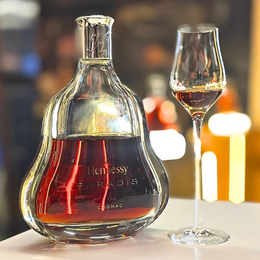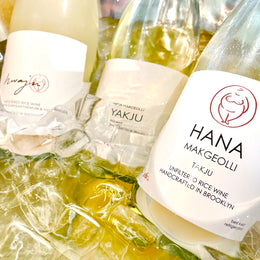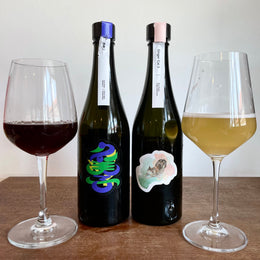The Oldest Baijiu Is A Masterclass In Being A Smooth Operator: We Try Shanxi Province's Fenjiu
Editor’s note: People say many things about baijiu, and we think it's the world’s most misunderstood spirit. But if you know the basics, you’ll find good baijius that are layered, complex and as enjoyable as whiskies, rums and tequilas. For those starting out, read our baijiu primer to learn the 4 main types of baijiu, and why the stuff is so popular.

There’s a famous ancient poem from during the Tang Dynasty in China (circa 600 AD) that young children are still taught in school today. It talks about travellers looking to drown their sorrows at a tavern during “Qing Ming festival” or the Chinese festival of the dead:
Heavy rain falls, this Qing Ming season,

The road is filled with mournful travellers,
One asked for directions to a wine tavern,
A shepherd boy points them to Apricot Blossom Village (杏花村).

The Apricot Blossom Village (or Xinghua Village) mentioned in this poem is the birthplace of Fenjiu, where the baijiu has been made by this village’s inhabitants for over a thousand years.
Often regarded as the embodiment of the perfect Light Aroma-style baijiu, Fenjiu is one of the oldest brands to have existed amongst the baijiu brands of China, and is described as the “Founder of the baijiu industry”. In fact, Fenjiu’s founding predates the iconic Moutai (which Henry Kissinger loved) by several centuries.

While most other famous baijiu brands are content to run with tacky, over the top product design and kitsch marketing posters, Fenjiu has in recent years stands out for building for itself a very sleek, tasteful and polished brand image. It's part of their strategy, just let me explain.
There’s a general consensus amongst baijiu connoisseurs that Strong Aroma baijiu is the most desirable and prestigious style among the four styles. On the other hand, Light Aroma baijiu is generally ranked last in desirability due to its mild and light fragrance, and comparatively simpler flavour profile. Yet as baijiu gains international prominence, Light Aroma baijiu is poised to have the most international appeal. And it's really due to its approachability.
New Westernised drinkers may get knocked off their socks by the potency of most baijiu styles, Fenjiu’s Light Aroma style is like a mild and easy-going neighbour who’s always a joy to hang out with. This mellowness makes it very easy to drink amongst drinkers of whisky, brandy and rum outside of China, and it is this growth opportunity that Fenjiu – the best of the Light Aroma category – seems to be positioning itself for.

Fenjiu is made from mainly sorghum and a smaller proportion of barley and other grains, and double-distilled like many Scotch whiskies. The spirit is also mixed with pure spring water drawn from the Gouzhuang spring near the village, resting below a nearby forest. All of this magic unfolds in a distillery complex that is mind-bogglingly huge – a whopping 18 square kilometres which, for perspective, is 10 times the size of the Macallan Distillery!

During Jiu Asia 2023, our team got a taste of a wide variety of old baijius that we ordinarily can't afford. So let’s dive right into our review of this premium Fenjiu lineup!

Fenjiu Qinghua 20 Years Old Baijiu (汾酒青花20年), 53% ABV - Review
The Fenjiu Qinghua (or the name “Qinghua” is a reference to Blue Floral Pottery) is the flagship range of premium baijiu from the distillery. The baijiu had been mainly aged in traditional ceramic earthen vessels and aged for a full 20 years for flavours to be integrated and mellowed.

Nose: Pure, refined and verdant. Brims with a gentle citrusy zest, green appley fragrance and subtle notes of tart umeshu, blending harmoniously with an unmistakable coastal note akin to that found in certain Scotches (such as Old Pulteney or Caol Ila).
Palate: Refined, mellow and well-balanced. Pleasantly oily and velvety texture. Opens very clean and pure with a mellow sweetness of water chestnuts, followed by a light tinge of sour plums. The finale of the palate unfolds with striking minerality, reminiscent of fresh spring water and brine.
Finish: Unceasingly long, clean and perpetuating with a mild aroma sweet soy sauce gently fading in a memorable signature.

My Thoughts: 👌🏻Delightfully refined and really accessible.
While some may be apprehensive of baijiu to some degree, this is indeed one of the lightest and smoothest, with a character that can readily be appreciated by enthusiasts of Scotch, Japanese whiskies, or sake. Despite a rather straightforward profile, this baijiu presents a great interplay of interlaced flavours that leave behind a lingering, pleasant memory.
This is an excellent choice to share with those seeking baijiu for the first time.
Fenjiu Qinghua 30 Years Old Baijiu (汾酒青花30年), 53% ABV - Review
This is from the same premium Qinghua range, and had been aged for 30 years.

Nose: Also pristinely clean and refined, but the nose is significantly more vibrant and fruity compared to its younger sibling. It sings of green apples, Asian pear, and even a bit of steamed corn and barley adding depth and contrast. Underlying it all, there's a faint whisper of green tea leaves and a familiar echo of seaspray.
Palate: Refined, well-balanced and vibrant. Texture is akin to the 20 Years Old, and also has a sense of freshness and purity. Yet it stands out by leaning towards more sweetness than the 20 Years Old – red apples, pears make an entrance, seamlessly mellowing into mild bitterness of chrysanthemum flower tea and a faint steamed barley note. Another layer of distinctive minerality and brine begin to show up toards the end.
Finish: Very long, clean and lightly perfumed, with trailing notes of brine, plums and jasmine flowers that leave a lasting imprint on the palate.

My Thoughts: 🌄 Vibrant as a sunrise over the Wu Tang mountains.
Demonstrating more complexity and yet maintaining enviable balance. Just like the 20 Years Old, this expression is accessible and smooth on the palate. The main distinction between the 20 and 30 Years Old lies not in their quality, but rather their stylistic differences.
Those who prefer a more complex baijiu might find themselves leaning towards the 30 Years Old, charmed by its intricate interplay of contrasting notes of steamed barley and tea. Yet, the purists, many of who appreciate the classic structure of a Light Aroma baijiu, might favour the 20 Years Old for its unwavering commitment to showcasing citrus, fresh green apples, and a light, clean tartness. For them, the additional flavours present in the 30 Years Old might seem to distract from the fundamental Light Aroma profile. Thus, both versions stand in their own right, each appealing to different facets of baijiu appreciation.
Fenjiu Silk Road Baijiu (汾酒丝绸之路), 55% ABV – Review
Launched fairly recently in 2019, the Fenjiu Silk Road edition is the top-end product from their core range, and as the name “Silk Road” implied, company confirmed during their launch event in Hong Kong that this product is targeted for the overseas markets.
The spirit is said to be selected from the top 1.9% of the distillery’s annual output.

Nose: Bright and aromatic. Much more hefty florals compared to the 30 Years Old, with notes of rose, jasmine and honeysuckles.
Palate: Vibrant, sweet but with an incredibly elegant reveal. The introduction is a symphony in slow motion: a gentle and restrained floral sweetness that gradually crescendos into a pronounced fruity intensity – like taking the first bite of a ripe stone fruit. Accompanying this wave of flavours is a nice persistent warmth.
Just as the 30 Years Old, this variant also exhibits the vibrant notes of red apples, pears, and plums. However, here the flavours are bolder, more precise and intentional. The brininess or barley previously noted in the 30 Years Old are subdued but still perceptible towards the finish.
Finish: A little sooner than the 30 Years Old – clean, floral and lightly perfumed with mellow plums and rose.

My Thoughts: 🎯Bold, precise and intentional.
This expression is surprisingly robust and intense for a Light Aroma style baijiu, wielding a bold sweetness and pleasant warmth with exacting precision. Its structure impresses, as it gently escalates in intensity and recedes just as smoothly. Unlike the ambitious 30 Years Old which plays a multifaceted symphony of fruits, florals, and earthiness, this variant demonstrates a focused maturity, knowing exactly which chords to strike and instruments to use. This is a harmonious composition that confidently takes the centre stage.
Fenjiu Bamboo Leaves 10 Years Old Herb-Infused Baijiu Liqueur (汾酒竹叶青10年), 38% ABV - Review
Here’s an interesting piece of historical fact: people regularly consumed alcohols for medicinal and therapeutic purposes. During the Middle Ages, medicines came in the form of raw herbs and powders, and there wasn’t a Pfizer or Moderna to supply you with injections or gelatine pills. Some of these nasty-tasting medicines also couldn’t be dissolved in water. Early physicians therefore used distilled spirits as a medium to dissolve medicines and let the sick drink them.
This practice became widespread in ancient China, and as people began creating and refining their “tonic wine” recipes, the bamboo leaves liquor (竹叶青酒) became a very popular type of therapeutic alcohol that is enjoyed by noble peoples over a thousand years ago. This drink was made by steeping bamboo leaves and several other Chinese herbs in strong liquor, ideally Light Aroma baijiu for a cleaner taste.
Fenjiu’s 10 Years Old Bamboo Leaves Liqueur is made in pretty much the same way as the ancients did: bamboo leaves and 11 other secret herbs and spices (kinda like KFC) were steeped in 10-year-old Fenjiu for about a month, infusing it with a complex, herbaceous quality. Cane sugar is also added to taste.

Nose: Fresh, verdant, and invitingly herbaceous. Led by a gentle woodiness, underpinned by dried ginseng and angelica roots. This earthy, herby blend is complemented by a delicate and fresh note of plums, softly rounded off by a whisper of vanilla sweetness.
Palate: The palate comes as close to Chinese dessert soup as you could probably get in the realm of spirits. It opens with a mild honeyed sweetness (indeed, this product contains sugar), balanced with the light bitterness of ginseng, angelica roots, toasted coconuts, and vanilla. The mouthfeel is much more akin to an alcoholic cordial than a spirit, making for a delicately light and approachable drink.
Opens with a mild honeyed sweetness (yes, there’s rock sugar in this product), light bitterness of ginseng, angelica roots, toasted coconuts and vanilla. The mouthfeel is much lighter and closer to a cordial than a spirit.
Finish: The finish is distinctive and immediately transports you to an old school TCM medical hall. There's an unmissable note reminiscent of Po Chai Pills (保济丸), evoking a fading array of familiar yet elusive Chinese herbal medicines I can’t put a finger on.

My Thoughts: 🥃🫖 Pleasantly sweet and invigorating – like drinking an Irish hot toddy.
A clean, tasty concoction that might leave you scratching your head and unable to find a reference by which to judge it. It’s not really a baijiu and tastes pretty far in texture (very light and watery) and flavour from one. It’s also quite different in character from most fruited or desserty liqueurs the likes of umeshu or coffee whiskey liqueur.
I’d compare this to an Irish spiced hot toddy (whiskey, lemon, herbs, spices and hot water) traditionally drunk in cold weather, or traditional Chinese herbal dessert soups. It’s an excellent choice for those looking for a different take on baijiu or anyone with a palate for the charm of traditional Chinese herbal mixtures. Indeed, Hong Kong bartenders are even exploring making cocktails with this bamboo leaves liquor.
I’d like to try this hot if I get the chance.
Conclusion
And so, we conclude our journey through the remarkable history, production, and allure of Fenjiu baijiu. Honestly, I didn’t expect to learn that this brand of baijiu to be linked to a poem I learnt when I was only 12 years old during Mandarin classes. Neither did I expect Fenjiu’s Bamboo Leaves Liquor – which technically is a sweetened liqueur – to be made from a recipe that essentially has not changed for thousands of years.
While the baijiu industry is a vast and complex tapestry of heavy styles and piquant flavours, Fenjiu's emphasis on elegance and subtlety has seen it carve out a unique niche in the international market. As someone who has definitely drunk more “western” liquors than baijiu, I do think that Fenjiu’s taste profile does hold great promise in winning over spirit lovers from around the world.
So, here's a toast to Fenjiu, quite possibly baijiu's best hope of capturing the hearts and minds of overseas drinkers. From being a domestic underdog (a Light Aroma baijiu) this brand has become an important asset in helping the category chart its furture direction.
Ganbei!

@CharsiuCharlie







